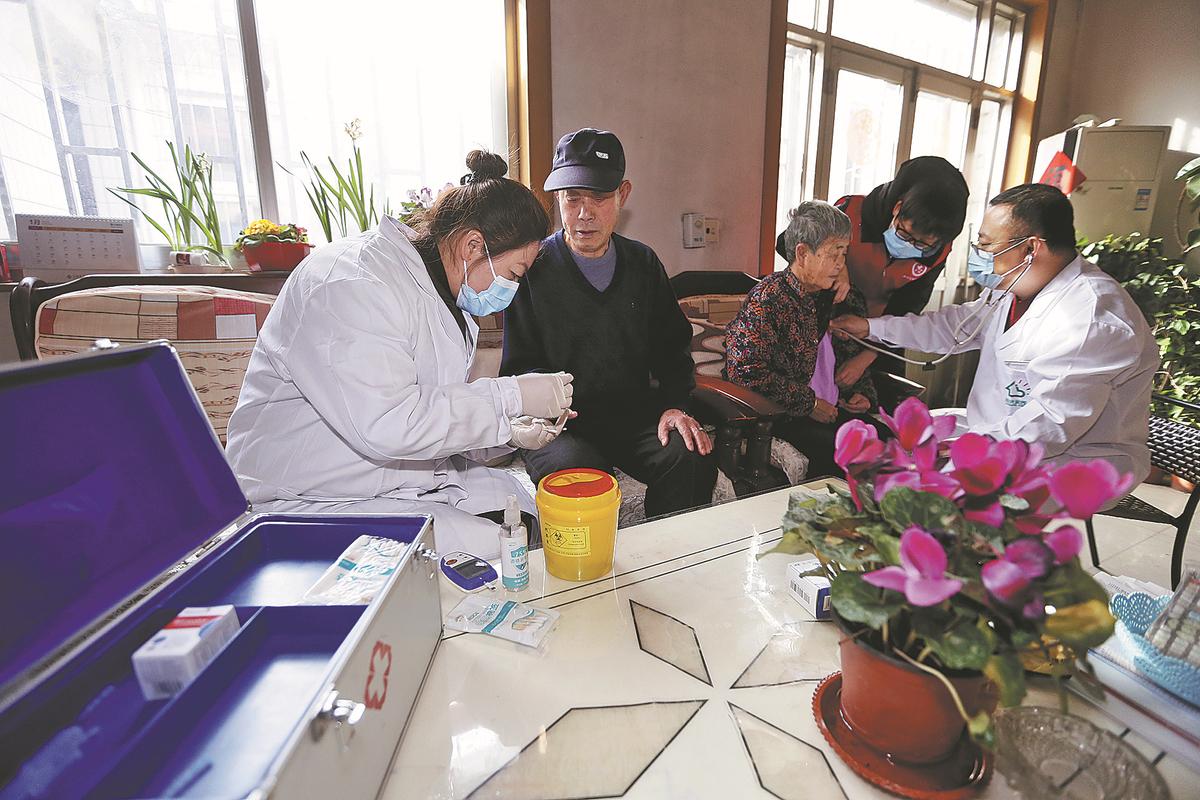Remote areas focus of COVID assistance
 0 Comment(s)
0 Comment(s) Print
Print E-mail China Daily, February 17, 2023
E-mail China Daily, February 17, 2023

Doctors visit seniors at home to check on their health in Jimo district, Qingdao, Shandong province, on Feb 2. [Photo/China Daily]
As the COVID-19 outbreak in China draws to an end, special attention has been paid to the country's sparsely populated and remote regions to improve their capability to fight against the disease, authorities said recently.
China gradually eased COVID-19 curbs starting in November. Infections in urban and rural areas peaked in late December and have been on a steady decline since.
However, infection rates in remote mountainous regions, pastoral areas, forest regions and islands remain low, said Wu Hongyao, deputy director of the Office of the Central Rural Work Leading Group and a senior Party official at the Ministry of Agriculture and Rural Affairs.
"It is important to continuously monitor and keep track of the epidemic situation in these regions while strengthening social assistance measures," he said during a teleconference on Feb 5.
Mao Dezhi, deputy head of the department of rural cooperative economy of the ministry, said that such regions are usually isolated and far away, with inconvenient transportation, unstable communication infrastructure and a scattered population.
"We have asked localities to prioritize such areas when distributing medicines and medical supplies and increase stockpiles there," he said on Feb 9. "Local governments are also encouraged to deliver antivirus health kits to vulnerable groups in these regions, as seen in Chongqing, the Guangxi Zhuang and Inner Mongolia autonomous regions."
Su Ming, a family doctor from a rural clinic in the Dalad Banner in Inner Mongolia, said that he had recently sent a number of health kits to infected elderly patients who were recovering.
He said the banner had found that many recovered elderly patients reported fatigue, shortness of breath and other symptoms during surveys. It had thus decided to send health kits containing eight days' worth of traditional Chinese medicine including a herbal soup and Shengmaiyin, a well-known TCM formula aimed at boosting energy, to farmers and herders in the region.
Mao, the official, said that remote regions have also developed novel methods to monitor the health of local residents.
"For instance, in the mountainous regions in Wufeng county in Hubei province, residents are encouraged to look after their neighbors by observing whether smoke travels up from kitchen chimneys in the morning, whether their doors are open at noon and whether lights are turned on at night," he said. "Such a method is practical and tailored to local conditions."
He said that preparedness for emergencies, especially extreme weather such as typhoons and flooding, has been stepped up in these regions.
"In Zhoushan, a coastal city in Zhejiang province, authorities have organized emergency routes, terminals and passenger ferries to ensure that ships responsible for transferring patients are on standby around the clock," he said.
Zhou Chunqin, a family doctor in Hengsha township of Shanghai's Hengsha Island, said that ferries are the only way for residents to leave the island. That means if the township's emergency aid team left the island and another severe patient emerges, the patient will likely have to wait for two to three hours for the team to travel back.
To deal with the dilemma, Zhou said that township authorities have designated family doctors to transfer critical patients when an emergency arises.
He said that local officials are in contact with helicopters and maritime vessels in advance so that they can be relied upon for transferring cases when local ferry companies have to halt operations under extreme weather.






Go to Forum >>0 Comment(s)